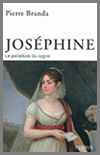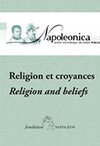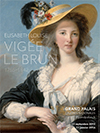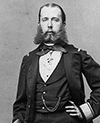| |
| |
THE DECLINE OF NAPOLEONIC HISTORY TEACHING IN FRANCE
In France today, never has the importance of history teaching in schools been so clear. We have seen pupils unwilling to respect the minutes of silence for those killed by terrorists and, with the blood barely dry, ready to believe in (ungrounded!) conspiracy theories of state collusion. At a time when ideological influence has murderous results, what we need is clear thinking. This can only come by careful instruction in what used to be called the artes humaniores, which in France became the sciences humaines, perhaps assimilable to the social sciences (provided of course you believe in society…)
Our humanity and the values traditionally associated with it – namely, reflection, analysis, weighing up, passion versus equanimity – are the daily bread of the historian. How we teach this to our children is therefore of great importance. We must try to remain unshackled by dogma (political or religious). ‘Telling it how it was' so as better to ‘tell it how it is'.
In the French bulletin this week, Thierry Lentz details the half-thought-out and failed reforms of an ideologically-driven French national education. Promises regarding syllabuses have been broken, and the French Revolution and the First Empire (not to mention Napoleon I or III) have all but disappeared from school history teaching. Add to this the dismantling of a research group fundamental to the work of the prestigious Institut d'Histoire de la Révolution Française, founded in 1937 in part through the energy of Robert Lefebvre, and you have a parlous situation.
At a time when citizens in the French Republic need (and some are demanding) to know their past in order better to see who they are, it is not less but more, and better, XIXth-century history that we need. And that right from the earliest school years!
Peter Hicks
Historian and Director of International Relations at the Fondation Napoléon
FONDATION NEWS
We are delighted to announce the statistics of napoleon.org 2015. More than 4 million sessions in the year, with 100,000 individual readers each month. Every Friday, a bulletin in French and English went out to more than 8,500 readers. Thank you for your continued interest in all we do, especially since we are currently working on an update of napoleon.org, which we hope will go online in the spring.
We, the team, at the Fondation Napoléon wish all of you, our readers, a happy and peaceful 2016.
OBITUARY
Gerard Hertault graduated in engineering from the École de Hautes Études industrielles and the École supérieure d'Électricité, and then continued his training as a reserve officer at the École supérieure de guerre navale (High school for Naval Warfare). He was fascinated by history from a very young age and was passionate about the First and Second Empire. A long-time member of the Souvenir Napoléonien and the Société Historique des Amis de Napoléon III, he also published several books with the support of the Fondation Napoléon and the publishers Nouveau Monde Édition, namely: Schulmeister, dans les coulisses de la Grande Armée; Franc-maçonnerie et Sociétés Secrètes contre Napoléon, naissance de la nation allemande; and Napoléon III et la Roumanie.

|
|
|
| |
BOOK OF THE MONTH > JOSEPHINE LE PARADOXE DU CYGNE
Josephine, the most famous woman of the First Empire, has primarily been remembered for her infidelities and failure to produce an heir as well as for her extravagant tendencies. Pierre Branda has conducted an investigation into the woman behind this clichéd image of Napoleon's first wife and love of his life. More than a biography, Josephine the swan paradox is a refreshing revelation and a tribute to Josephine.:
INTERVIEW > "JOSEPHINE, A POKER PLAYER WITH AN UNREADABLE FACE"
Pierre Branda, who revealed some of the secrets of Napoleon in some of his previous books, talks to Marie de Bruchard about the paradox of Josephine and the discoveries he made during his most recent research.
Read our exclusive translation of the forward to Pierre Branda's new biography of Josephine.

|
|
|
| |
NAPOLEONICA.LA REVUE > ISSUE NUMBER 23: RELIGION AND BELIEFS
The new issue is now online, on the topic of the History of Religion and beliefs during the First Empire, from a political, artistic and literary point of view. As well as Peter Hicks's Éditorial (in French), there are three articles in French and one in English, namely:
- Roland Minnerath, Le concordat de Bonaparte et son actualité
- François Boespflug, Napoléon et Dieu. Iconographie comparée
- Vincent Petit, Saint Napoléon, un saint pour la nation. Contribution à l'imaginaire politique français
- Giulia Delogu, “Poetic Portraits”: From the Ideal Freemason to the Cult of Napoleon
CERCLE D'ÉTUDES LECTURES AT THE FONDATION NAPOLEON
The Winter Season of lectures at the Fondation Napoléon in Paris continues on Tuesday 19 January 2016 with Philippe Perfettini "L'héritage napoléonien d'Ajaccio" (in French) for which inscriptions open on Wednesday 13 January. Details here (in French).

|
|
|
| |
9 JANUARY 1873 > DEATH OF NAPOLEON III
On 9 January, Napoleon III, who had been living in exile at Camden Place in Chislehurst in the South of England, died at the age of 64 after complications following a gall-stone operation. He was buried at St Mary's Catholic Church in Chislehurst. Later, Eugénie his widow decided to build a monastery and a chapel for his remains. In 1888, the body (together with their son, the Prince Imperial who was killed by Zulus in South Africa in 1879) was interred in the Imperial Crypt at St Michael's Abbey, Farnborough, Hampshire, England.
Here is an account of Napoleon III's first funeral ceremony, from the memoirs of George Augustus Sala, published in 1895.
COMMEMORATION
A mass to commemorate the anniversary of the death of Napoleon III will be held at the Church of Saint-Augustin in Paris (France) at 6.30pm on 9 January 2016.
DID YOU KNOW?
The oldest surviving “blue plaque” in London (commemorative plates that celebrate the residences of famous people) is that on 3 King Street in Westminster, marking the spot where Napoleon III lived in 1848 during his earlier period of exile. (external link)

|
|
|
| |
LAST DAYS > EXHIBITIONS IN PARIS
If you happen to be in Paris in the next few days, don't miss two exhibitions which will be closing soon:
Splendeurs et misères. Images de la prostitution, 1850-1910 (Splendour and Misery. Pictures of Prostitution), at the Musée d'Orsay (until 17 January), explores the ways in which the imagery of the “ladies of the night” nourished the imagination of a generation of Second Empire Painters.
And Élisabeth Louise Vigée-Lebrun (1755-1842), at the Grand Palais, (until 11 January)
celebrates the portraits of a female prodigy whose career spanned the Ancien Regime, the First Empire and the Restoration, with such illustrious clients as Marie-Antoinette and Caroline Murat whose double portrait with her daughter was last month's Painting of the Month on Napoleon.org.

|
|
|
| |
150 YEARS AGO > A TURNING POINT IN THE MEXICAN CAMPAIGN
With the help of the Americans, the republican general Mariano Escobedo took the town of Bagdad from Maximilian's Empire on 4 January 1866. The end of the American Civil War and the departure of the French effectively allowed the United States to intervene in the Mexican conflict and to concentrate on their Southern frontier. On the 15 January, Napoleon III announced to Maximilian that he would be withdrawing from affairs in Mexico. Find out more in our special close-up on the Mexican Campaign.
Wishing you an excellent Napoleonic week!
Peter Hicks and Rebecca Young
THE NAPOLEON.ORG BULLETIN No. 784, 8 - 14 January, 2016
Interested in the work of the Fondation Napoléon? Why not participate, either generally or towards a specific project, by making a donation?

|
|
|
|
|
|
|
|
Follow us on our new English-language Facebook page and on Twitter!
napoleon.org - related content:
BOOK OF THE MONTH:
BRANDA, Pierre, Joséphine. Le paradoxe du cygne (Perrin, 2016)
PRESS REVIEW
- Jeffrey Cox's Romanticism in the shadow of war: literary culture in the napoleonic war years reviewed by Philip Shaw
WHATS ON (see our website for all events)
Exhibitions
- Franceschini-Pietri, Napoleon III's secretary Palais Fesch, Ajaccio , Corsica [27/11/2015 - 09/05/2016] NEW
- Delacroix et l'antique (Delacroix and Antiquity), Musée Delacroix, Paris, FR [09/12/2015 - 07/03/2016] NEW
- Ingres, Museo Nacional del Prado, Madrid, Spain [24/11/2015 - 27/03/2016]
- High Spirits: The Comic Art of Thomas Rowlandson The Queen's Gallery, Buckingham Palace, London UK [13/11/2015 - 14/02/2016]
- Land of conquest and mystery: Napoleonic Egypt in Bologna, Civic Museum of the Risorgimento in Bologna, Italy [28/11/2015 - 16/01/2016] LAST DAYS
- Le secret de l'État. Surveiller, protéger, informer. XVIIe-XXe siècle, Archives Nationales, Paris [04/11/2015 - 28/02/2016]
- Visages de l'effroi : violence et fantastique de David à Delacroix, Musée de la Vie Romantique, Paris, FR [03/11/2015 - 28/02/2016]
- Napoléon (1769-1821), sa vie à travers les femmes, Tourist Centre of Wool and Fashion, Verviers, Belgium [10/10/2015 - 28/02/2016]
- Splendeurs et misères. Images de la prostitution, 1850-1910 (Splendour and Misery. Pictures of Prostitution), Musée d'Orsay, Paris, France [22/09/2015 - 17/01/2016] LAST DAYS
- Élisabeth Louise Vigée-Lebrun (1755-1842), Grand Palais, Paris, France [23/09/2015 - 11/01/2016]
LAST DAYS
Conferences
Pierre Branda: "Joséphine le paradoxe du cygne" Fondation Napoléon, Paris, FR [26/1/2016]
SEEN ON THE WEB
- Hero of the Peninsular Campaign against Napoleon Surgeon Cured Himself of Malaria and Typhoid Fever With Lemonade
- British Library digitizes George III's massive map collection
- video > Surgery During the Napoleonic Wars
THE BIBLIOTHÈQUE MARTIAL-LAPEYRE FONDATION NAPOLEON LIBRARY
The library is normally open on Mondays and Tuesdays from 1pm to 6pm and on Thursdays and Fridays from 10am to 3pm. The library is closed on Wednesdays.
Online database catalogue
Digital Library
Contact
NAPOLEONICA LES ARCHIVES
Site of digitised Napoleonic archival material:
The working papers or 'imprimés' of the Napoleonic Conseil d'Etat, the correspondence of Vivant Denon, etc.
http://www.napoleonica.org
Contact: napoleonica@napoleon.org
NAPOLEONICA. LA REVUE
International peer-review interdisciplinary e-review on the history of the two Empires, bilingual French-English, 3 issues per year, free access.
Read the review on Cairn.info
Contact: napoleonicalarevue@napoleon.org
The Fondation Napoléon's Institutional website:
www.fondationnapoleon.org
ACCOUNT DETAILS
To change your email address, unsubscribe, and sign up for the French information bulletin.
Problems with a link in this letter?
- Check the homepage on: http://www.napoleon.org/en/home.asp
- View back numbers of the bulletin: http://www.napoleon.org/en/space/information_bulletin/archive_lettre.asp
- Contact us: information@napoleon.org
|
|






